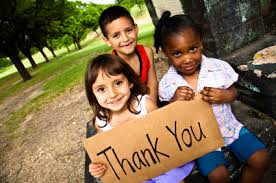Does Your Preschooler Have Manners?

Wouldn't it be nice if good manners came naturally to children? Unfortunately, they do not! Good manners need to be taught, explained and reinforced over and over. While it is never too early for adults to role model positive behavior, there are a variety of areas in our lives that can include good manners. When to teach your child how to behave in these situations and using their manners, will vary depending on their age and development.
“Please”, “Thank you” and “Excuse me” are simple phrases to start role modeling and teaching your young child manners. However, there are many different and important areas of life, where good manners are not only expected but necessary for success.
• Table Etiquette
• Telephone Skills
• Respect for other people and things
• Good Sportsmanship
• Playing Well with Others
General Manners: Begin role modeling positive behavior as soon as your child is alert and attentive, the earlier the better. Teaching them to use the "key five phrases" whenever appropriate is the most basic way to start. " Please", " Thank you", " You're welcome", Excuse me" and " I'm sorry". Use these phrases at all times and have your child use the phrases when appropriate as well. Avoid letting them get away with demanding for something. Let them know that a demanding statement such as “I want a snack” is not polite. Instead ask them if they can think of a nicer way to ask for a snack, and help them if they are having difficulty. This will help them learn to use appropriate phrases at the proper times. You could say, " May I have a snack please?" while explaining that asking for something is much nicer than demanding. If you do this with all of the five key phrases, just keep repeating and role modeling these phrases and your child will eventually get the hang of them!
Table Manners: Preschoolers will make a mess at the table... it's inevitable. Try to ignoring the mess and start instilling other good table manners. Once they have better control of utensils, they should be capable of having well rounded table manners. First, have your children wash their hands before all meals and snacks. This helps keep everyone healthy at the table. Have them remove hats, keep their elbows off the table, chew with their mouth closed, and say "excuse me" when a burp slips out.
Playing Well with Others: This is such an important time for children to be learning how to play with others, as they are entering preschools, day cares, play groups, lessons etc.. Skills like how to share toys with children, asking to use a toy instead of taking something out of another child's hand, waiting their turn in line or for a toy, and using words instead of pushing or hitting others are important to help your child get along in preschool and beyond. Explain why waiting in line is important, and how they feel when someone take their toy without asking, or "hogs" a toy all day. Helping them understand empathy or how the other child would feel if they did those things, will help them get along better with others.
Respect for Others and Things: Remembering the " Golden Rule" works well here. Teach your child the rule, " Treat others as you would like to be treated." This also relates to their personal items and toys. As always, role model respect in your life as well, with your spouse, friends and belongings.
Good Sportsmanship and Phone: Both of these specific areas will come a little later in life, after preschool, but it's never to early to talk to your child about these areas and to role model. Answering your phone in a nice manner, asking who’s calling, and asking them to "hold please" while you let the person know they have a phone call are a few examples. If you witness good or even bad sportsman like conduct, explain this to your child. At home, have all players shake hands and say, " Nice game" after a board or sports game.
Try not to make a big deal out of correcting inappropriate manners. Correct the child's manners only once or twice during a short amount of time, and continue to reinforce the correct manners by role modeling. When a situation arises, be sure to explain the consequences of their inappropriate behavior. This helps their understanding of why their actions are hurtful. Lastly, try to give positive attention and reinforcement to only good behavior and manners, and resist attention to bad behavior.
Here are a few books that address manners in a kid friendly and fun way. Take a trip to your local library if you don't own any of these.
1. Froggy Eats Out by Jonathan London
2. Mary Louis Loses Her Manners by Diance Cunco
3. How Do Dinosaurs Eat Their Food? by JaneYolen and Mark Teague
4. Madeline Says Merci by John Bemelmans Marciano
We hope you take some time to explore some of the examples above. If you have any questions we are here at http://www.ifnotyouwho.org. Thanks for stopping by!
